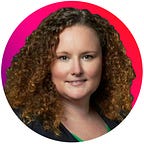Diana Heinrichs, Lindera: “AI is built for the masses”
Diana Heinrichs’ mission is nothing less than to maintain the mobility and autonomy of elderly citizens. With her company Lindera, she founded an app that can analyze body movements and detect fall risks.
In our REWRITE TECH podcast, we talked to Diana about her personal motivation to found Lindera and what challenges she had to overcome while founding a tech startup in Germany.
Diana Heinrichs:
As the life expectancy rises, the average age of society increases. That not only brings structural problems but also personal difficulties when family members get older and need an increased level of care. Falls are a particularly increased risk with age and the prevention of falls is a common goal in elderly care.
This is exactly where Diana Heinrichs’ idea starts. Lindera translates geriatric assessments into a software-driven product that can be used on smartphones. A relatively simple task at first was soon confronted with the first pushbacks, as Diana remembers: “I talked to Fraunhofer ITWM and they said it’s simple, but it won’t work. You can’t analyze three-dimensional pictures through a smartphone camera.”
But Diana wasn’t thrown off by the scientific evaluation. She formulated the mathematical problem and reached out to every single PhD candidate in northern Germany. “This is how we set up our data science team and solved the problem. Now we are the only company in the world that can do 3D geriatric assessments.”
Lindera didn’t just find a solution, they are meeting the scientific gold standard and their solution is evidence-based. And just as important: it is easy to use. People only need to record a 30-second video of someone with their own smartphone and provide some additional information regarding the subject’s medication. The 2D recording then gets split into many slices, so neutral networks can transform it into a 3D model.
“It’s a really nice self-service that puts the senior in the centre of digital attention.”
Tech for the elderly
Initially, the idea of founding Lindera was triggered by a personal experience. Diana’s own grandmother received care provided by Diana’s mother and, somehow, it just worked. “How can it be that in my family it just works?”, Diana wondered.
To get to the core of this, Diana paused her job at Microsoft Germany, took an internship in an outbound care service, and talked to many specialists in the field. “When we look at our ageing society,” she found, “it is absolutely clear that we need new solutions.” Diana decided to focus on fall prevention, one of the most important areas of elderly care and geriatric assessment that wasn’t digitalized yet.
Doing the impossible
The scientists at Fraunhofer weren’t the only ones that didn’t believe in her idea as she recalls: ”Something I know very well is: ‘yes but’”. Unlike in the United States, it’s uncommon in Germany to combine science and business, limiting the innovative possibilities. “We can’t just outsource innovation to Fraunhofer”, Diana said.
From her experience in selling her solution to care homes, Diana stumbled upon many people, who don’t understand how artificial intelligence works and demand exclusivity. “AI is built for the masses. It’s about to build a database, which we can learn from”, she states. In order for Germany to keep pace with innovations, the understanding of technology must improve, Diana says: “I hope we can get beyond this narrow mindset.”
Listen to REWRITE TECH with Diana Heinrichs from Lindera
Listen to the full conversation with Diana Heinrichs on our REWRITE TECH Podcast, which is available on all common audio streaming platforms including Spotify and Apple Podcasts.
Don’t miss out on our other episodes, including:
- Dr Carmen Köhler (Austrian Space Forum) talks about analogue astronauts and space travel
- Kenza Ait Si Abou (Deutsche Telekom) explains the powers and limitations of artificial intelligence
- André Christ (LeanIX) talks about his enterprise architecture scale-up
- Christian Hardenberg (Delivery Hero) gives insights into the technical challenges of growth
